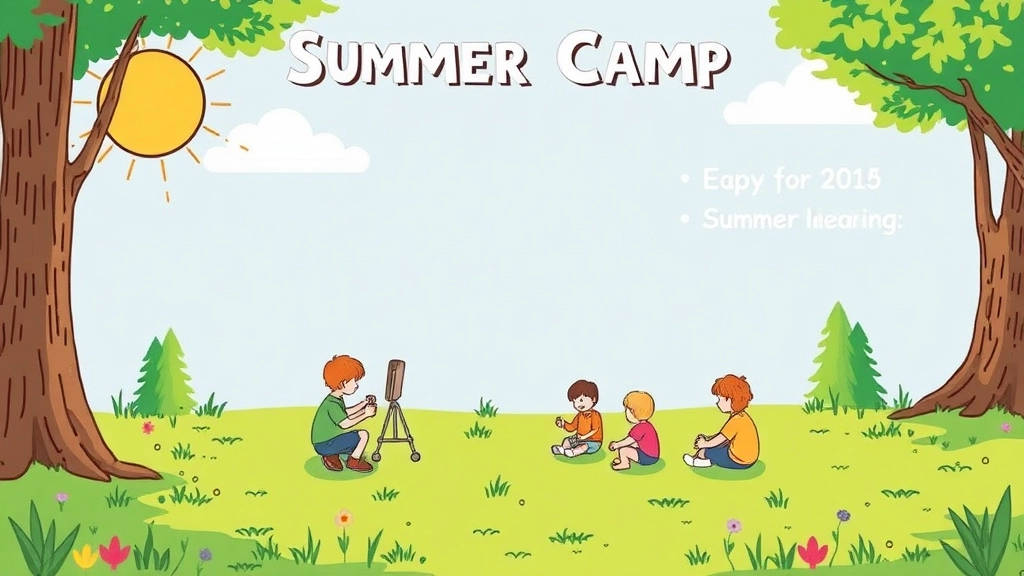Understanding the True Meaning of Summer Camp
Ever wondered about the true meaning of a summer camp and its impact on your child’s growth? You’re not alone. From traditional to speciality camps, the options are endless and can feel overwhelming. This article dives into the various types of summer camps, their benefits, and how they contribute to your child’s social and emotional development. We’ll also explore popular activities, safety measures, and tips for choosing and preparing for the right camp.
The Importance of Summer Camps
Summer camps are more than just a break from school; they are pivotal in fostering independence, building social skills, and enhancing educational development. Whether it’s through outdoor adventures, creative arts, or team-building games, camps offer unique experiences that shape your child’s future.
Join the Journey
Join me as we navigate the maze of summer camps, ensuring your child has a safe, enriching, and memorable experience. Let’s unlock the true summer camp meaning together!
Different Types of Summer Camps
Ever found yourself wondering, “What type of summer camp is right for my child?” Well, you’re not alone. With so many options out there, it can feel like navigating a maze. But don’t worry, I’ve got you covered. Let’s break down the different types of summer camps so you can find the perfect fit for your kiddo.
Traditional Summer Camps
Traditional summer camps are the classic go-to. Think of the ones you see in movies with campfires, canoeing, and arts & crafts. These camps offer a mix of activities that keep kids engaged and active, perfect for those who love variety.
Benefits of Traditional Camps:
- Variety of Activities: From swimming to hiking, your child will never get bored.
- Social Skills: Interacting with a diverse group of peers helps in building social skills.
- Nature Exposure: Great for kids who love the outdoors.
Speciality Camps
If your child has a specific interest or talent, speciality camps are the way to go. These camps focus on one area, like sports, arts, or science.
Types of Speciality Camps:
- Sports Camps: For the budding athlete, these camps focus on skills and teamwork.
- Arts Camps: Perfect for the creative soul, offering painting, music, and drama.
- STEM Camps: Ideal for the curious minds interested in science, technology, engineering, and maths.
Adventure Camps
For the thrill-seekers, adventure camps offer activities that get the adrenaline pumping. Think rock climbing, white-water rafting, and zip-lining.
Why Choose Adventure Camps?
- Builds Confidence: Overcoming physical challenges boosts self-esteem.
- Teamwork: Many activities require working together, enhancing team spirit.
- Nature Connection: Kids learn to appreciate and respect the natural world.
Academic Camps
These camps are for the brainiacs who love to learn, even during the summer. Academic camps focus on subjects like maths, languages, and coding.
Perks of Academic Camps:
- Skill Enhancement: Kids get to dive deeper into subjects they love.
- Preparation: Helps in preparing for the upcoming school year.
- Networking: Great for meeting like-minded peers.
Day Camps vs. Overnight Camps
One of the biggest decisions is whether to go for a day camp or an overnight camp.
Day Camps:
- Home Comfort: Kids return home each day, making it easier for first-timers.
- Local: Usually closer to home, reducing travel time.
- Flexible: Often offer shorter sessions, perfect for busy schedules.
Overnight Camps:
- Independence: Kids learn to be self-reliant.
- Immersive Experience: Being away from home allows for a deeper connection with the camp community.
- Longer Friendships: More time to bond with peers.
Virtual Camps
In today’s digital age, virtual camps have become increasingly popular. These camps offer activities and learning experiences online.
Why Consider Virtual Camps?
- Convenience: No need to travel.
- Cost-Effective: Often cheaper than traditional camps.
- Wide Range of Options: From coding to cooking, the possibilities are endless.
Family Camps
Family camps are a unique option where the whole family can join in on the fun. These camps offer activities that cater to all ages, making it a great bonding experience.
The Benefits of Attending a Summer Camp
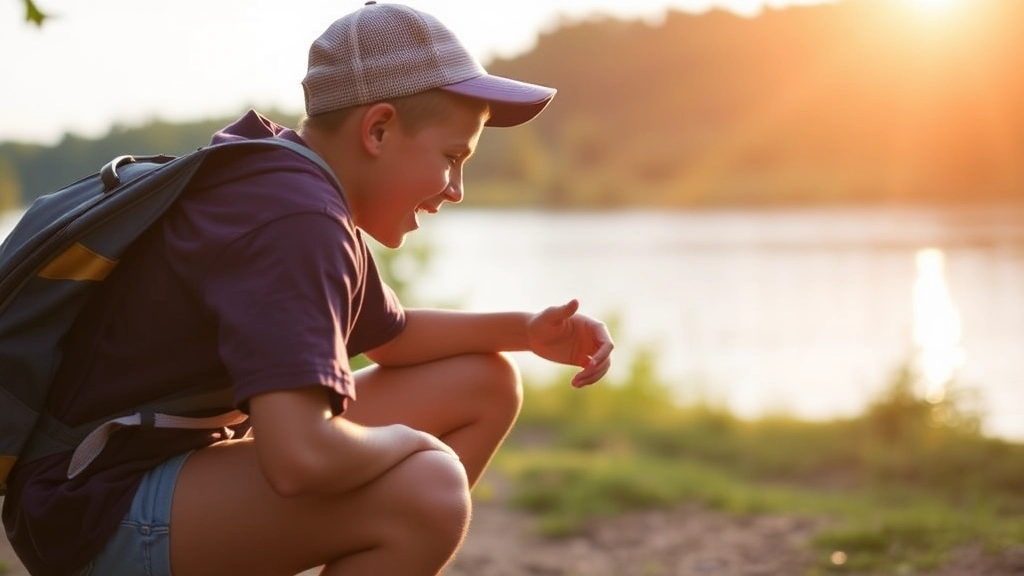
Ever wondered if sending your child to a summer camp is worth it?
Let’s break it down.
Why Summer Camps?
Summer camps are more than just fun and games. They’re a chance for kids to grow, learn, and make memories. And trust me, the benefits are huge.
Building Independence
Kids learn to stand on their own two feet. They make decisions without mum or dad around. This builds confidence and independence.
Social Skills on Steroids
Meeting new people? Check. Making friends? Double check. Camps are a social playground, helping kids develop communication skills.
Learning New Skills
From archery to arts and crafts, there’s something for everyone. Kids can discover new passions or hone existing ones.
Unplugging from Screens
We all know the screen struggle. Camps offer a break from tech, getting kids outside and active.
Boosting Confidence
Trying new things can be scary. But at camp, kids are encouraged to step out of their comfort zones.
Emotional Growth
Camps help kids manage emotions and build resilience. They learn to cope with being away from home.
Why It Matters
These benefits aren’t just for now. They set kids up for future success. So, if you’re on the fence about summer camps, think about the growth opportunities.
Social and Emotional Growth Through Summer Camps
Wondering if summer camp is worth it for your kid? You’re not alone. Many parents question if sending their child away for a few weeks will really make a difference. Spoiler alert: it will. Summer camps are more than just a place to have fun; they’re a breeding ground for social and emotional growth. Here’s why:
Building Independence
Summer camp is often the first time a child is away from home for an extended period. This experience is crucial for fostering independence. Kids learn to:
- Make Decisions: Without parents around, they have to navigate choices on their own.
- Manage Time: From waking up on time to managing their daily schedule, it’s all on them.
- Solve Problems: Whether it’s a disagreement with a bunkmate or figuring out how to complete a challenging activity, problem-solving skills get a major boost.
Enhancing Social Skills
Let’s face it, making friends can be tough. But summer camps create an environment where socialising is almost inevitable. Kids learn to:
- Communicate Effectively: With new friends and camp counsellors, kids practice expressing themselves clearly.
- Collaborate: Many camp activities require teamwork, teaching kids the importance of working together.
- Empathise: Living in close quarters with others fosters empathy and understanding.
Boosting Self-Esteem
There’s something magical about achieving a goal you set for yourself. At summer camp, kids get countless opportunities to do just that. Whether it’s:
- Mastering a New Skill: From archery to arts and crafts, kids gain confidence as they get better at something new.
- Overcoming Fears: Whether it’s a fear of heights or swimming, conquering these fears can be incredibly empowering.
- Receiving Positive Feedback: Camp counsellors are trained to provide constructive and encouraging feedback.
Developing Emotional Resilience
Life isn’t always smooth sailing, and camp is no different. Kids learn to handle:
- Disappointment: Not every activity will go as planned, and that’s okay.
- Homesickness: Missing home is a real challenge, but overcoming it helps build emotional strength.
- Conflict: Disagreements happen, and learning to resolve them is a valuable life skill.
Creating Lifelong Memories
The friendships and experiences kids gain at summer camp often last a lifetime. These memories are not just fun stories to tell; they shape who they become.
- Shared Experiences: These create strong bonds that can last well beyond the summer.
- Traditions and Rituals: Many camps have unique traditions that become cherished memories.
- Personal Growth: The personal development that happens at camp stays with kids forever.
So, is summer camp worth it? Absolutely. The social and emotional growth your child will experience is invaluable. From building independence to developing emotional resilience, summer camp offers a unique environment for growth.
Looking for more insights on summer camps? Check out our section on 2024 Summer Camp Guide and Summer Camp Fun at Crossroads.
Popular Activities Offered at Summer Camps
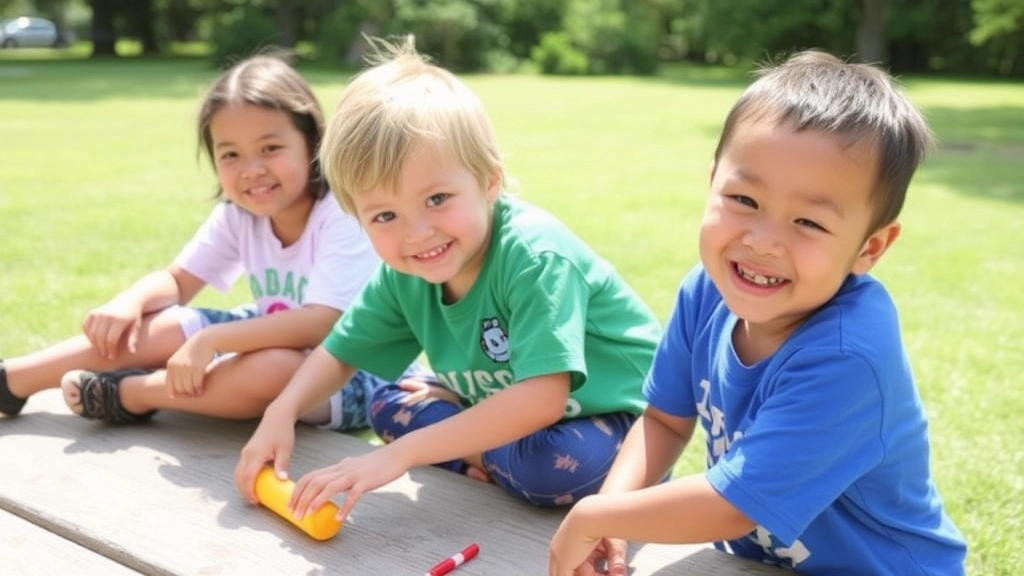
Ever wondered what your kid will actually do at summer camp?
I get it.
You’re not just sending them off to some mystery land.
You want to know they’ll have a blast and maybe even pick up a skill or two.
So, let’s dive right in.
Outdoor Adventures
First off, think of all the outdoor adventures.
Summer camps are goldmines for these.
From hiking and canoeing to rock climbing and zip-lining, there’s no shortage of ways to get the heart pumping.
Kids love the thrill, and it’s a fantastic way to get them off their screens and into nature.
Sports Galore
Next up, sports.
Whether it’s football, basketball, or even archery, summer camps usually have a full roster of sports activities.
This isn’t just about keeping them active; it’s about teaching teamwork and discipline.
Plus, they might discover a new passion.
Creative Arts
Now, let’s talk about the creative arts.
Think painting, music, drama, and dance.
These activities give kids a chance to express themselves and maybe even find their inner Picasso or Shakespeare.
And hey, it’s a great way to build confidence.
STEM Activities
Don’t forget STEM activities.
Yes, summer camps aren’t just about fun and games.
Many camps offer science experiments, coding classes, and even robotics.
It’s like sneaking veggies into their favourite meal.
They’re learning, but they’re having so much fun they don’t even realise it.
Water Sports
And who can forget the water sports?
Swimming, kayaking, and paddleboarding are just a few of the options.
Kids get to cool off and develop their swimming skills.
It’s a win-win.
Team Building Games
Team building games are another staple.
These aren’t just for fun; they teach problem-solving and cooperation.
From scavenger hunts to obstacle courses, these activities are designed to bring kids together and build lasting friendships.
Evening Campfires
Lastly, the classic evening campfires.
Think s’mores, ghost stories, and sing-alongs.
It’s the stuff memories are made of.
And let’s be honest, who doesn’t love a good campfire?
Got any questions or worries?
Drop a comment below.
And if you’re still on the fence about which camp to choose, check out our guide on Choosing the Right Summer Camp for Your Child.
Happy camping!
Choosing the Right Summer Camp for Your Child
Choosing the right summer camp for your child can feel like navigating a maze, right? With so many options out there, it’s easy to get overwhelmed. But don’t worry, I’ve got your back. Let’s break it down so you can make the best choice without losing your mind.
What are Your Child’s Interests?
First off, know your kid. What makes them tick? Are they into sports, arts, or maybe science? There are camps out there for everything under the sun. Here’s a quick rundown:
- Sports Camps: Great for kids who love to stay active. Think football, basketball, swimming, you name it.
- Arts Camps: Perfect for the little Picassos and future Broadway stars.
- STEM Camps: Ideal for those budding scientists and tech enthusiasts.
- Adventure Camps: For the thrill-seekers who love the great outdoors.
Day Camp or Sleepaway Camp?
Next up, consider whether a day camp or a sleepaway camp is more suitable. Day camps are fantastic if you’re not quite ready to let your child stay overnight. They get the camp experience but come home at the end of the day. Sleepaway camps, on the other hand, offer a more immersive experience where kids can build independence and lasting friendships.
Check Out the Camp’s Reputation
You wouldn’t buy a car without reading the reviews, right? Same goes for summer camps. Look up reviews and testimonials. Ask other parents, check online forums, and even visit the camp if possible. A good camp should have a solid track record of safety and fun.
Safety First
Speaking of safety, this is non-negotiable. Ensure the camp has the right safety measures and supervision. Ask about their staff-to-camper ratio, medical facilities, and emergency procedures. You want peace of mind knowing your child is in good hands.
Budget Considerations
Let’s get real for a moment. Cost is a big factor. Camps can range from affordable to âare you kidding me?â expensive. Set a budget and stick to it. Sometimes, the pricier options offer scholarships or payment plans, so don’t be afraid to ask.
Location Matters
Think about the camp’s location. Is it close to home or miles away? Proximity can affect not only convenience but also how comfortable you and your child feel about the camp experience.
Camp Philosophy and Values
Every camp has its own vibe and philosophy. Some are all about competition, while others focus on cooperation and personal growth. Make sure the camp’s values align with what you want for your child.
Involve Your Child in the Decision
Finally, include your child in the decision-making process. After all, they’re the ones going! Discuss the options, visit the camps together if possible, and get their input. This will not only make them more excited about going but also ensure the camp is a good fit.
For a comprehensive guide to summer camps in your area, check out our Richmond Summer Camps Ultimate Guide. If you’re considering sleepaway camps, our Top Sleepaway Camps: A Parent’s Guide might be just what you need.
Preparing Your Child for Their First Summer Camp Experience
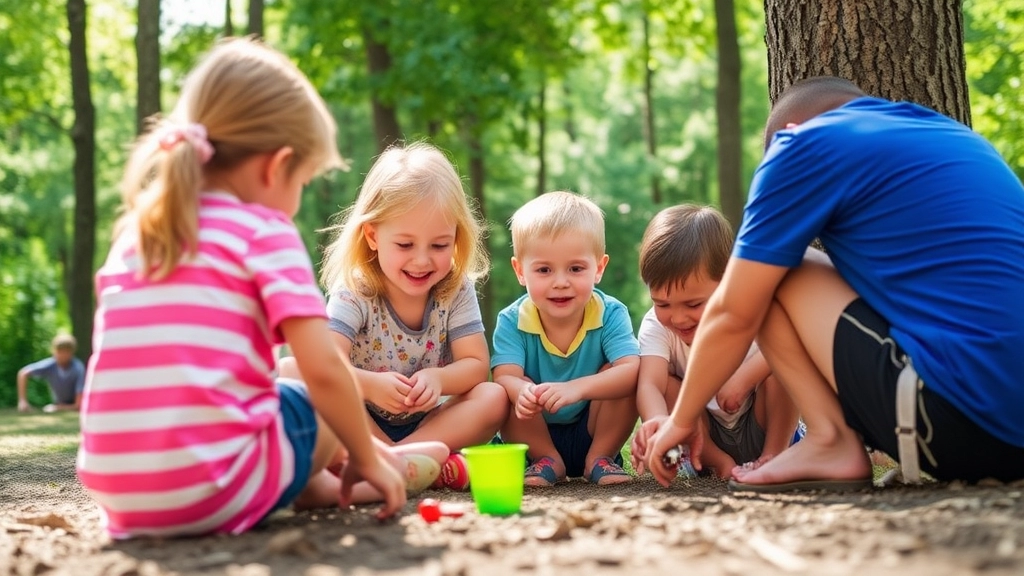
Worried about sending your child to their first summer camp?
I get it.
It’s a big step.
You’re probably asking yourself: Will they be safe? Will they make friends?
Let’s break it down.
Start with a Conversation
First thing, talk to your child.
Ask them how they feel about camp.
Are they excited? Nervous?
Listen to their concerns.
Reassure them that it’s normal to feel a mix of emotions.
Visit the Camp
If possible, visit the camp beforehand.
Seeing the place can make it feel more familiar and less intimidating.
Meet the staff, check out the facilities.
It helps both you and your child feel more comfortable.
Pack Smart
Packing can be a game-changer.
Create a checklist together.
Include the essentials:
- Clothes (label everything)
- Toiletries
- Comfort items (like a favourite stuffed animal)
- Medications (if any, with clear instructions)
Practice Independence
Summer camp is all about independence.
Start practising at home.
Let them:
- Make their bed
- Choose their clothes
- Pack their own bag
These small steps build confidence.
Social Skills
Encourage social skills.
Talk about:
- Making new friends
- Sharing
- Being kind
Role-playing scenarios can be super helpful.
Emergency Plan
Discuss an emergency plan.
What should they do if they feel homesick or have a problem?
Make sure they know:
- Who to talk to
- Where to find help
Stay Positive
Keep the vibe positive.
Share your own camp stories if you have any.
Excitement is contagious.
Final Check-In
The night before, do a final check-in.
Review the packing list.
Reassure them.
Remind them that it’s okay to miss home, but they’ll have a blast.
Keep in Touch
Most camps have a way to stay in touch.
Whether it’s letters, emails, or scheduled calls, make use of it.
But also, give them space to grow.
Ready to Go
When the day comes, keep it upbeat.
A quick hug, a big smile, and off they go.
Remember, this is a huge growth opportunity for them.
And for you.
History and Evolution of Summer Camps
Ever wondered where summer camps came from and how they’ve changed over the years? You’re not alone. Many parents and kids alike are curious about this. So, let’s dive in.
The Birth of Summer Camps
Summer camps have been around for quite some time. The concept started in the late 19th century. Back then, the industrial revolution was in full swing, and cities were getting crowded. Parents wanted their kids to escape the hustle and bustle of urban life and connect with nature. The first recognised summer camp was established in 1861 by Frederick William Gunn in Connecticut, USA. It was a simple idea: get kids outdoors, away from city life, and teach them skills they wouldn’t learn in school.
Early 20th Century: Formalising the Experience
By the early 20th century, summer camps weren’t just about getting kids outside; they became more structured. Organisations like the Boy Scouts and Girl Scouts started popping up, offering a mix of outdoor activities and character-building exercises. These camps focused on teaching survival skills, teamwork, and leadership.
Post-War Boom: The Golden Age of Camps
After World War II, summer camps experienced a boom. With more disposable income and a growing middle class, parents were keen to invest in their children’s experiences. Camps started to diversify. You had camps for sports, arts, academics, and even specialised camps for kids with disabilities. This was the golden age of summer camps, where the variety and quality of programs skyrocketed.
The Digital Age: Adapting to New Realities
Fast forward to the 21st century, and summer camps have had to adapt to a new set of challenges. With the rise of technology, kids are more connected to screens than ever before. Camps have had to find a balance between traditional outdoor activities and incorporating tech in a meaningful way. Think coding camps, robotics, and even eSports.
The Future of Summer Camps
What’s next for summer camps? The future looks promising. There’s a growing focus on mental health and wellness, with camps offering mindfulness and emotional intelligence programs. Environmental sustainability is also becoming a key focus, with many camps teaching kids about conservation and eco-friendly practices.
Why Knowing the History Matters
Understanding the history and evolution of summer camps helps us appreciate their value. It shows us that these camps are more than just a place to send your kids for a few weeks. They’re a vital part of their social and emotional growth, offering experiences that shape them into well-rounded individuals.
Overcoming Common Summer Camp Challenges
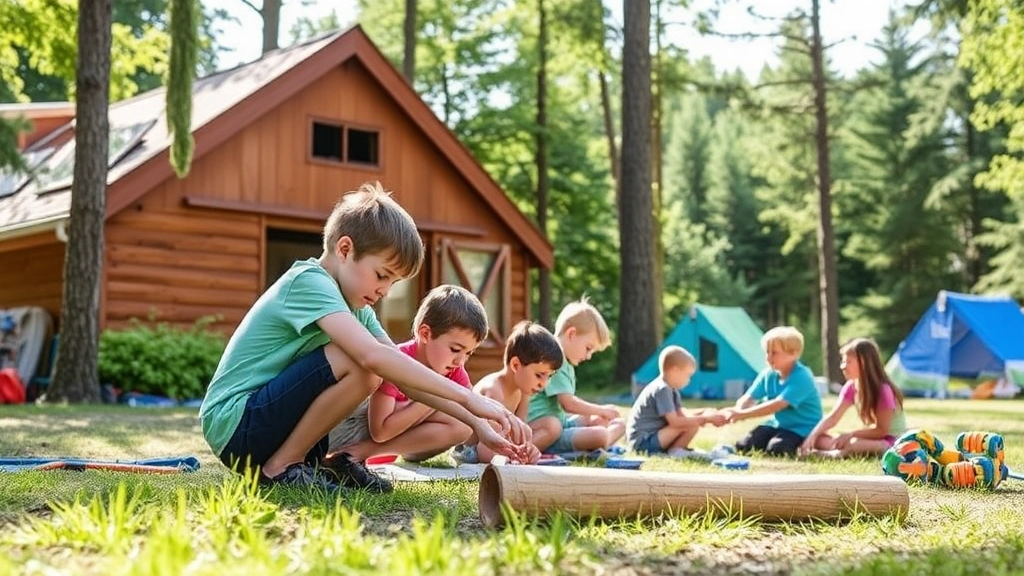
Worried about your child facing challenges at summer camp?
You’re not alone.
Many parents share the same concerns.
Let’s break it down and tackle these common issues head-on.
Homesickness
Homesickness is a biggie.
Kids miss home, parents, and their usual routines.
But guess what?
It’s totally normal.
Here’s how we can help:
- Talk about it beforehand: Let your child know it’s okay to feel homesick.
- Pack familiar items: A favourite teddy or family photo can work wonders.
- Stay positive: Encourage them to stick it out and enjoy the experience.
Making Friends
Another common worry is making friends.
Not every child is a social butterfly.
So, how do we ease them into it?
- Role-play scenarios: Practice introducing themselves and starting conversations.
- Encourage group activities: Camps are full of team games and group projects.
- Talk to the camp staff: They can help your child connect with others.
Fear of New Activities
New activities can be daunting.
Whether it’s rock climbing or canoeing, fear can creep in.
Here’s how to handle it:
- Start small: Encourage them to try less intimidating activities first.
- Share success stories: Tell them about other kids who faced their fears and had fun.
- Reassure them: Let them know it’s okay to feel scared and that trying is what counts.
Staying Safe
Safety is a top concern.
Parents worry about accidents and injuries.
But summer camps are prepared.
Here’s what you can do:
- Research: Look into the camp’s safety measures and protocols.
- Communicate: Talk to the camp staff about your concerns.
- Equip your child: Teach them basic safety rules and how to ask for help.
Handling Bullies
Bullying can happen anywhere, even at camp.
But it doesn’t have to ruin the experience.
Here’s our game plan:
- Open dialogue: Encourage your child to talk about their day and any issues.
- Know the policy: Understand the camp’s anti-bullying policy.
- Empower your child: Teach them how to stand up for themselves and seek help.
Adapting to Camp Life
Adjusting to camp life can be tough.
New environment, new routine.
Here’s how to make the transition smoother:
- Practice at home: Try a mini “camp” experience at home.
- Gradual separation: If possible, start with day camps before overnight ones.
- Stay connected: Write letters or send care packages to remind them you’re thinking of them.
Remember, overcoming these challenges is part of the growth process.
Your child will come back stronger, more independent, and full of stories to share.
So, let’s embrace these challenges and turn them into opportunities.
Safety Measures and Supervision in Summer Camps
Worried about your child’s safety at summer camp? You’re not alone. It’s a top concern for every parent sending their kid off to camp for the first time. Let’s break down how camps handle safety and supervision to put your mind at ease.
Why Safety Measures at Summer Camps Matter
First things first, safety measures at summer camps are not just about preventing accidents. They cover a wide range of scenarios, from health emergencies to emotional well-being. Camps today are well-equipped to handle almost anything that comes their way. But what does that actually look like?
Here’s a quick rundown:
- Health Protocols: Camps have strict health protocols in place. Think regular health checks, 24/7 medical staff, and easy access to local hospitals.
- Trained Staff: Camp staff aren’t just there to lead activities. They’re trained in CPR, first aid, and often have specialised training in child psychology and behaviour management.
- Emergency Plans: Every camp worth its salt has a detailed emergency plan. This includes everything from fire drills to evacuation procedures.
Supervision: Keeping an Eye on Every Camper
You might be thinking, “How can they possibly keep an eye on every kid?” Good question. Camps use a variety of methods to ensure constant supervision.
- Low Camper-to-Staff Ratios: The best camps maintain low camper-to-staff ratios, often around 5:1 or even lower. This ensures that every child gets the attention they need.
- Buddy Systems: Many camps use buddy systems to keep kids accountable to each other. It’s a simple but effective way to ensure no one is ever alone.
- Regular Head Counts: Frequent head counts, especially during transitions between activities, help keep everyone accounted for.
Real Stories: How Camps Handle Safety
Let me share a quick story. Last summer, at a well-known camp, a kid sprained his ankle during a hike. Within minutes, trained staff were on the scene, administering first aid and contacting the camp’s medical team. The child was back on his feet and participating in activities the next day. This is the level of care and readiness you can expect.
What to Look For When Choosing a Safe Summer Camp
So, how do you make sure the camp you choose is up to snuff? Here are some tips:
- Check Accreditation: Look for camps accredited by organisations like the American Camp Association (ACA). Accreditation means the camp meets high standards for health, safety, and programme quality.
- Ask About Staff Training: Don’t hesitate to ask about the training staff receive. Are they certified in first aid and CPR? Do they undergo background checks?
- Review Emergency Procedures: Ask to see the camp’s emergency procedures. A good camp will have no problem sharing this information.
Final Thoughts
Safety measures and supervision in summer camps are designed to give you peace of mind while your child has the time of their life. From health protocols to trained staff and emergency plans, camps go above and beyond to ensure every camper is safe and sound. So, take a deep breath and know that your child is in good hands.
Remember, when it comes to choosing the right camp, safety should always be your top priority. For more tips, check out our summer camp packing checklist and learn about the culture and traditions of summer camps. And if you’re still feeling uneasy, don’t hesitate to reach out to the camp directly. They’re there to answer your questions and make sure you feel confident about your decision.
How Summer Camps Support Educational Development
Ever wondered if summer camps can actually help with learning?
You’re not alone.
Many parents worry about the “summer slide” where kids forget what they’ve learned.
But guess what?
Summer camps aren’t just about fun; they’re a goldmine for educational growth.
Real-Life Learning
Think about it.
Kids learn by doing, right?
At camp, they dive into hands-on activities that make learning stick.
- Nature exploration: Science comes alive in the great outdoors.
- Creative arts: Painting, drama, and music boost creativity and problem-solving.
- Team sports: Maths and strategy in action.
Building Essential Skills
Camps are like a playground for skills that schools might miss.
- Critical thinking: Solving real-life problems.
- Communication: Making new friends, working in teams.
- Leadership: Taking charge of projects or activities.
Personal Stories
I remember a parent telling me about their child who struggled with maths.
After a summer camp focused on STEM, they came back buzzing with excitement.
Suddenly, maths wasn’t a chore; it was an adventure.
Choosing the Right Camp
Worried about finding the perfect fit?
Look for camps that align with your child’s interests and strengths.
- Academic camps: Focus on specific subjects.
- Adventure camps: Combine learning with outdoor fun.
- Special interest camps: From coding to cooking, there’s something for every kid.
Preparing for Success
Make sure your child is ready to dive in.
- Talk about what they’ll learn.
- Encourage them to set personal goals.
- Pack the right gear for their activities.
Overcoming Challenges
What if they struggle?
Camps are designed to support growth, even when things get tough.
Counsellors are there to guide and cheer them on.
Safety First
Worried about safety?
Most camps have strict measures in place.
- Background checks for staff.
- First aid training.
- Clear communication with parents.
Educational Boost
By the end of summer, your child might surprise you.
They’ll come back not just with memories but with skills and confidence.
And that’s the real magic of summer camps.
So, when you think about it, summer camps are more than just a break from school.
They’re a step forward in your child’s educational journey.
For more tips on choosing the right camp, check out our ultimate guide for parents.
FAQs about Summer Camps
What is the meaning of a summer camp?
A summer camp is a supervised program for children or teenagers conducted during the summer months. It offers a variety of activities aimed at personal growth, skill development, and social interaction.
What are the benefits of attending a summer camp?
Attending a summer camp helps children build independence, enhance social skills, learn new activities, unplug from screens, boost confidence, and experience emotional growth.
What kind of activities can my child expect at a summer camp?
Children can engage in outdoor adventures, various sports, creative arts, STEM activities, water sports, team-building games, and enjoy evening campfires.
How can I prepare my child for their first summer camp experience?
Start with a conversation about their feelings, visit the camp beforehand, pack smartly, practice independence, encourage social skills, discuss an emergency plan, and stay positive.
What should my child pack for summer camp?
Essentials include clothes (label everything), toiletries, comfort items (like a favorite stuffed animal), and any necessary medications with clear instructions.
How can I help my child overcome homesickness at camp?
Talk about homesickness beforehand, pack familiar items, and stay positive to encourage them to enjoy the experience.
What if my child has trouble making friends at camp?
Role-play social scenarios, encourage participation in group activities, and communicate with camp staff to help your child connect with others.
How can I reassure my child about trying new activities at camp?
Encourage them to start with less intimidating activities, share success stories, and reassure them that it’s okay to feel scared and that trying is what counts.
Is summer camp safe for my child?
Research the camp’s safety measures and protocols, communicate with the staff about your concerns, and equip your child with basic safety rules and how to ask for help.
What should I do if my child faces bullying at camp?
Maintain open dialogue with your child, understand the camp’s anti-bullying policy, and teach your child how to stand up for themselves and seek help.
How can my child adapt to camp life more easily?
Practice a mini “camp” experience at home, consider starting with day camps, and stay connected through letters or care packages.
What are the long-term benefits of attending a summer camp?
Summer camps help set children up for future success by fostering independence, confidence, resilience, and various skills that contribute to personal growth.
References
-
The Benefits of Camp
-
Benefits of Sending Kids to Summer Camp
-
What Are the Benefits of Summer Camp?

